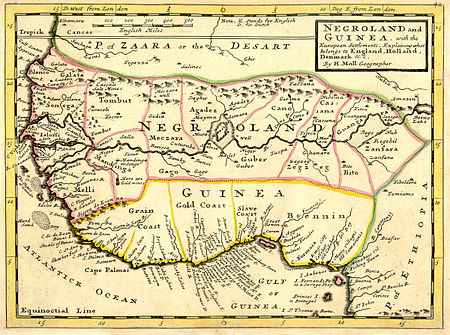The variants
neger and
negar, derive from the Spanish and Portuguese word
negro (black), and from the now-pejorative French
nègre (negro). Etymologically,
negro,
noir,
nègre, and
****** ultimately derive from
nigrum, the stem of the
Latin niger (black) (pronounced [ˈniɡer] which, in every other
grammatical case,
grammatical gender, and
grammatical number besides
nominative masculine singular, is
nigr-, the
r is
trilled).
In the
Colonial America of 1619,
John Rolfe used
negars in describing the African
slaves shipped to the
Virginia colony.
[3] Later
American English spellings,
neger and
neggar, prevailed in a northern colony, New York under the
Dutch, and in metropolitan Philadelphia's
Moravian and
Pennsylvania Dutch communities; the
African Burial Ground in New York City originally was known by the Dutch name "Begraafplaats van de Neger" (Cemetery of the Negro); an early US occurrence of
neger in
Rhode Island, dates from 1625.
[4] An alternative word for African Americans was the English word, "Black", used by
Thomas Jefferson in his
Notes on the State of Virginia.
Among Anglophones, the word ****** was not always considered derogatory, because it then denoted "black-skinned", a common Anglophone usage.[5] Nineteenth-century English (language) literature features usages of ****** without racist connotation, e.g. the Joseph Conrad novella The ****** of the 'Narcissus' (1897). Moreover,
Charles dikkens and
Mark Twain created characters who used the word as contemporary usage. Twain, in the autobiographic book
Life on the Mississippi (1883), used the term within quotes, indicating reported usage, but used the term "negro" when speaking in his own narrative persona.
[6]
During the fur trade of the early 1800s to the late 1840s in the Western United States, the word was spelled "niggur", and is often recorded in literature of the time.
George Fredrick Ruxton often included the word as part of the "mountain man" lexicon, and did not indicate that the word was pejorative at the time. "Niggur" was evidently similar to the modern use of dude, or guy. This passage from Ruxton's Life in the Far West illustrates a common use of the word in spoken form—the speaker here referring to himself: "Travler, marm, this niggur's no travler; I ar' a trapper, marm, a mountain-man, wagh!"
[7] It was not used as a term exclusively for blacks among mountain men during this period, as Indians, Mexicans, and Frenchmen and Anglos alike could be a "niggur".
[8] Linguistically, in developing American English, in the early editions of
A Compendious Dictionary of the English Language (1806),
lexicographer Noah Webster suggested the
neger new spelling in place of
negro.
[9]
By the 1900s, ****** had become a pejorative word. In its stead, the term colored became the mainstream alternative to negro and its derived terms.
Abolitionists in
Boston, Massachusetts, posted warnings to the
Colored People of Boston and vicinity. Writing in 1904, journalist Clifton Johnson documented the "opprobrious" character of the word
******, emphasizing that it was chosen in the South precisely because it was more offensive than "colored."
[10] Established as mainstream American English usage, the word
colored features in the organizational title of the
National Association for the Advancement of Colored People, reflecting the members' racial
identity preference at the 1909 foundation. In the Southern United States, the local American English
dialect changes the pronunciation of
negro to
nigra.
By the late 1960s, the social change achieved by groups in the United States such as the Civil Rights Movement (1955–68), had legitimized the racial identity word black as mainstream American English usage to denote black-skinned Americans of African ancestry. In the 1990s, "Black" was displaced in favor of the compound
blanket term African American. Moreover, as a compound word,
African American resembles the
vogue word Afro-American, an early-1970s popular usage. Currently, some black Americans continue to use the word
******, often spelled as
nikka and
nikkah, without irony, either to neutralize the word's impact or as a sign of solidarity.



 all over again.
all over again.



